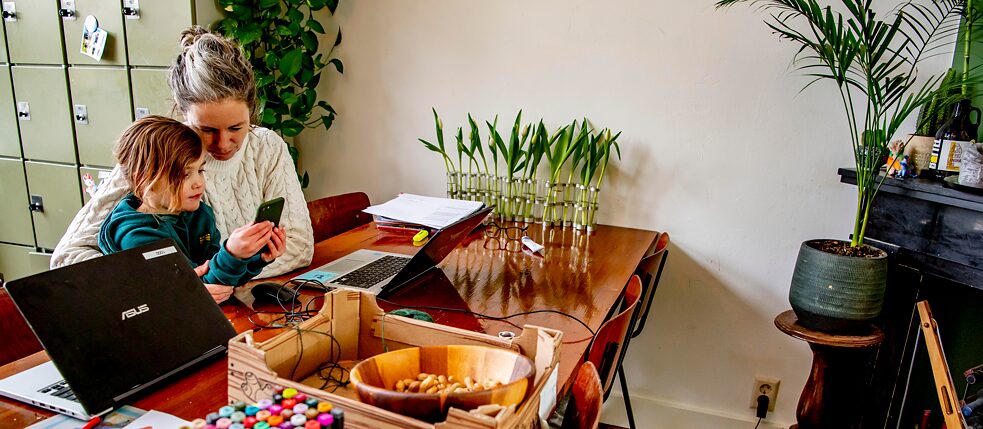Women
“There is still room for improvement”

How do things stand with the equality between men and women in Germany? Women are still suffering from the after-effects of the “stay-at-home mum” syndrome – opportunities and pay at work are unequal and the unpaid job of raising and caring for children at home is still largely done by women. This is a conversation with the author Nils Pickert about the liberation from gender clichés, gender-inclusive language and the “diaper drill” – the parental leave for fathers.
 As a freelance author and journalist, Nils Pickert writes primarily about equality, children and questions of upbringing, among others for the newspapers Die Zeit, taz and the Austrian Standard. Pickert also works for the NGO Pinkstinks, which campaigns against sexism in advertising. In 2012, he put on a skirt in solidarity with his son and it attracted quite a lot of attention.
| Photo: © Benne Ochs
Herr Pickert, Germany has one of the largest gender-specific wage gaps in the European Union, women earn an average of 19 per cent less than men – in purely mathematical terms, compared with men every year women work without pay until March 10th of a year. Why is the unequal pay discrepancy in Germany so pronounced?
As a freelance author and journalist, Nils Pickert writes primarily about equality, children and questions of upbringing, among others for the newspapers Die Zeit, taz and the Austrian Standard. Pickert also works for the NGO Pinkstinks, which campaigns against sexism in advertising. In 2012, he put on a skirt in solidarity with his son and it attracted quite a lot of attention.
| Photo: © Benne Ochs
Herr Pickert, Germany has one of the largest gender-specific wage gaps in the European Union, women earn an average of 19 per cent less than men – in purely mathematical terms, compared with men every year women work without pay until March 10th of a year. Why is the unequal pay discrepancy in Germany so pronounced?
This is due to a poor combination of the after-effects of the “stay-at-home mum” model, the maintenance of acquired rights, labour market segregation and gender stereotyping. Firstly, women are still held largely responsible for household chores as well as for the raising and caring of children. Secondly, everything should stay the way it was. Thirdly, in terms of reputation and pay, we view jobs in a worse light if they involve looking after people – these are often jobs in which predominantly women work, for example, as educators or nurses. And fourthly, the discussion about unequal job and career opportunities is loaded with statements and expectations such as: “You’re a woman, you have to look after the children! Of all the people who work part-time, it’s you women! Try not to be too brash and demanding, especially in salary negotiations and job interviews, otherwise you will appear unfeminine.”
Are there also things that are going particularly well in Germany when it comes to equality?
In 2020, Germany was in tenth place in the Global Gender Gap Report, as was the case in the previous year. This shows that a lot is going well. In many other countries, for example, paid parental leave with the right to return to work is unfortunately only wishful thinking. There is, however, still room for improvement, especially if one understands equality as an overall social responsibility. In terms of education, Germany is doing very well when it comes to gender equality. It only becomes difficult when it comes to shaping a career out of training. We still, however, strongly link access to education to social background and income, and if we are serious about equality, we have to approach it in an intersectional way.
Speaking of parental leave, in Germany, parents receive parental allowance for up to 14 months if both partners take parental leave or if the caring parent is a single parent. That is longer than in many other EU countries. Is this parental allowance an achievement on the way to gender equality?
It is definitely an important building block, but here too – the parental allowance was created primarily to give well-off female academics an incentive to have children. The single parent Hartz IV (unemployment benefit) recipient receives a monthly base rate of 300 euros, which is offset against Hartz IV. Can we really call this equality? In addition, to this day we have hardly had any means of persuading the fathers to take more than the usual two months of parental leave, also known as Wickelvolontariat (diaper drill). The instrument itself is good, its implementation could, however, be improved. This applies to many gender equality policies in Germany.
More and more journalists are using gender-sensitive language, meanwhile also the presenters of important German news programmes like “Tagesschau” or “Heute Journal”. Why is linguistic inclusion important – and why does it still sometimes meet with resistance?
Inclusion is important in every area – also in the linguistic one. Language is part of our identity. This is precisely why marginalised groups insist on being represented in language, and precisely why there is so much resistance from people who see their identity threatened by it. We have to ask ourselves why so many of us are ready to relentlessly defend our language and yet, at the same time, are not willing to accept the striving for inclusion of our fellow human beings or even to deem it contemptible. Language doesn’t need defence. People need advocacy and recognition.
In your writings you deal a lot with the topic of gender-inclusive upbringing and are the author of the book “Prinzessinnenjungs” (Princess Boys). Why is it so important to free not only girls, but also boys, from gender stereotypes? And above all – what is the best way to do it?
Because we also imbue boys with gender stereotypes. We devalue their feelings, their passion for beautification and their need for comfort. There is nothing wrong with a boy who is affectionate, compassionate, likes to take care of others and dress up. Let me repeat that – there is nothing wrong with this boy. We need to stop projecting our own stereotypical experiences and demands onto our boys. If they want to play football, be loud and compete with others – all well and good. If they want to put on make-up, dance and cuddle with each other – that’s fine, too. All of these things have no gender. They are all just part of human behaviour. That is why it is good that boys can cry, that they need consolation, seek closeness, are allowed to be afraid, accept their own insecurity. That’s all part of it. A society that turns away with discomfort or disgust from two pubescent boys walking hand in hand across the schoolyard has a serious problem. And that problem is not the two boys.
 “Women are still largely responsible for household chores as well as child-raising and caring work.” During the Corona lockdown, in many households it was mainly the mothers who looked after and homeschooled the children.
| Photo (detail): © picture alliance/Robin Utrecht
“Women are still largely responsible for household chores as well as child-raising and caring work.” During the Corona lockdown, in many households it was mainly the mothers who looked after and homeschooled the children.
| Photo (detail): © picture alliance/Robin Utrecht